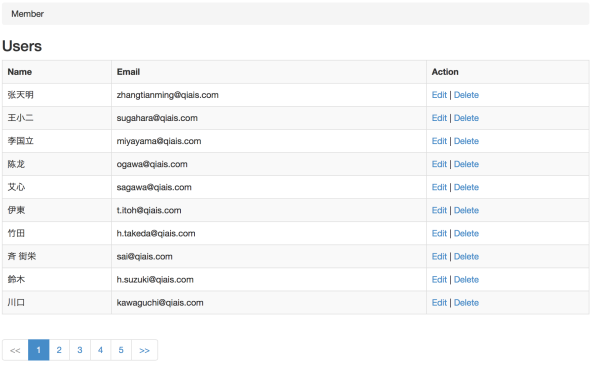Zend Framework2 会员管理项目之四: 用户列表分页功能
2014年03月09日
zend framework 2 的分页功能变得很简单又方便!这里介绍会员管理项目的分页显示功能。界面如下:
步骤一:修改module/Member/src/Member/Model/UserTable.php
public function fetchAll($paginated=false)
{
if ($paginated) {
$select = new Select('users');
$resultSetPrototype = new ResultSet();
$resultSetPrototype->setArrayObjectPrototype(new User());
$paginatorAdapter = new DbSelect(
$select,
$this->tableGateway->getAdapter(),
$resultSetPrototype
);
$paginator = new Paginator($paginatorAdapter);
return $paginator;
}
$resultSet = $this->tableGateway->select();
return $resultSet;
}
这里我们先创建了一个Select实例,select实例的limit与where会控制我们每页需要显示的数量及条件,然后创建DbSelect分页适配器去自动加载此实例。返回的结果与我们不使用分页时一样,都是User的实例列表。
步骤二:修改module/Member/src/Member/Controller/UserController.php
public function indexAction()
{
// for pagination
$userTable = $this->getServiceLocator()->get('UserTable');
$paginator = $userTable->fetchAll(true);
// set the current page to what has been passed in query string, or to 1 if none set
$paginator->setCurrentPageNumber((int) $this->params()->fromQuery('page', 1));
// set the number of items per page to 10
$paginator->setItemCountPerPage(10);
return new ViewModel(array(
'paginator' => $paginator
));
// for no pagination
//$userTable = $this->getServiceLocator()->get('UserTable');
//$viewModel = new ViewModel(array('users' => $userTable->fetchAll()));
//return $viewModel;
}
步骤三:更新module/Member/view/member/user/index.phtml
<h3>Users</h3>
<table class="table table-bordered table-striped">
<tr>
<th>Name</th>
<th>Email</th>
<th>Action</th>
</tr>
<?php
/*foreach ($users as $user) : */
foreach ($paginator as $user) :
?>
<tr>
<td><?php echo $this->escapeHtml($user->name);?></td>
<td><?php echo $this->escapeHtml($user->email);?></td>
<td>
<a href="<?php echo $this->url('member/user',
array('action'=>'edit', 'id' => $user->id));?>">Edit</a> |
<a href="<?php echo $this->url('member/user',
array('action'=>'delete', 'id' => $user->id));?>" onclick="return confirm('Are you sure?')">Delete</a>
</td>
</tr>
<?php endforeach; ?>
</table>
<?php
echo $this->paginationControl(
$this->paginator,
'sliding',
array('partials/paginator.phtml', 'User'),
array('route' => 'member/user')
);
?>
<hr />
步骤四:创建分页功能的部件
在module/Application/view下新建partials文件夹,然后在partials里面创建paginator.phtml文件,内容如下:
<?php if ($this->pageCount): ?>
<div>
<ul class="pagination">
<!-- Previous page link -->
<?php if (isset($this->previous)): ?>
<li>
<a href="<?php echo $this->url($this->route); ?>?page=<?php echo $this->previous; ?>">
<<
</a>
</li>
<?php else: ?>
<li class="disabled">
<a href="#">
<<
</a>
</li>
<?php endif; ?>
<!-- Numbered page links -->
<?php foreach ($this->pagesInRange as $page): ?>
<?php if ($page != $this->current): ?>
<li>
<a href="<?php echo $this->url($this->route);?>?page=<?php echo $page; ?>">
<?php echo $page; ?>
</a>
</li>
<?php else: ?>
<li class="active">
<a href="#"><?php echo $page; ?></a>
</li>
<?php endif; ?>
<?php endforeach; ?>
<!-- Next page link -->
<?php if (isset($this->next)): ?>
<li>
<a href="<?php echo $this->url($this->route); ?>?page=<?php echo $this->next; ?>">
>>
</a>
</li>
<?php else: ?>
<li class="disabled">
<a href="#">
>>
</a>
</li>
<?php endif; ?>
</ul>
</div>
<?php endif; ?>

